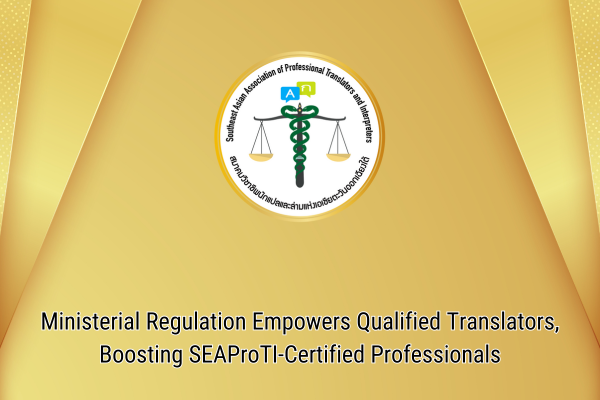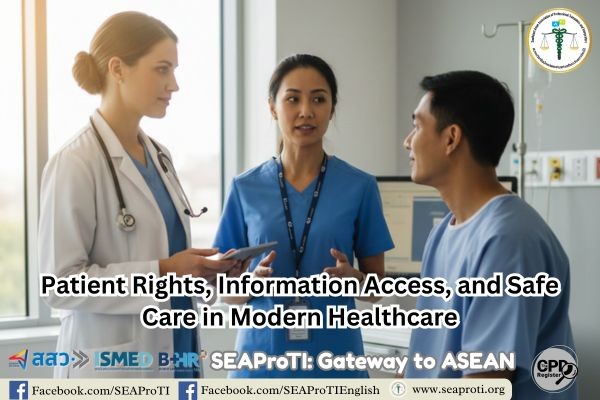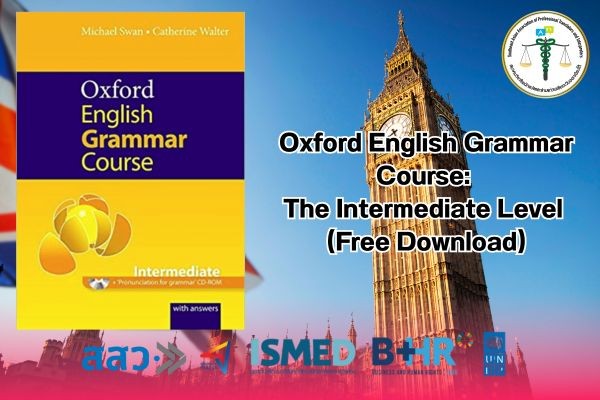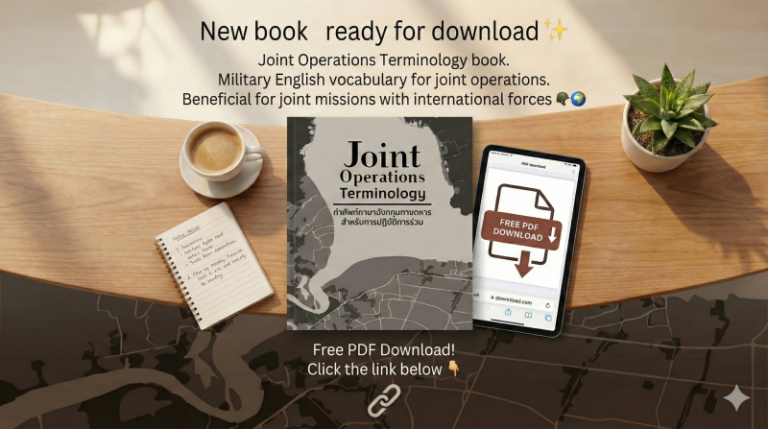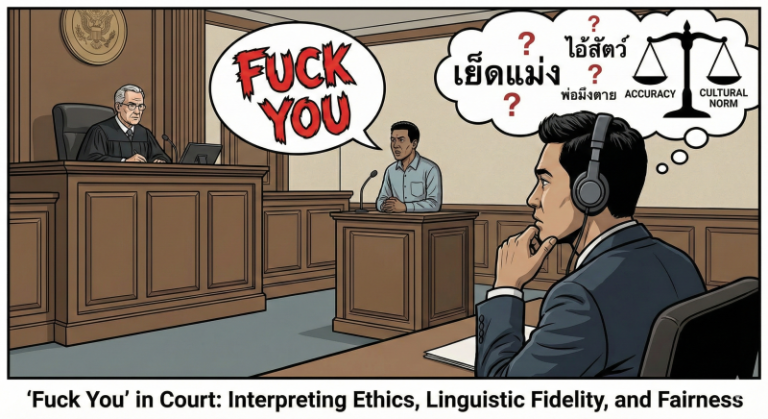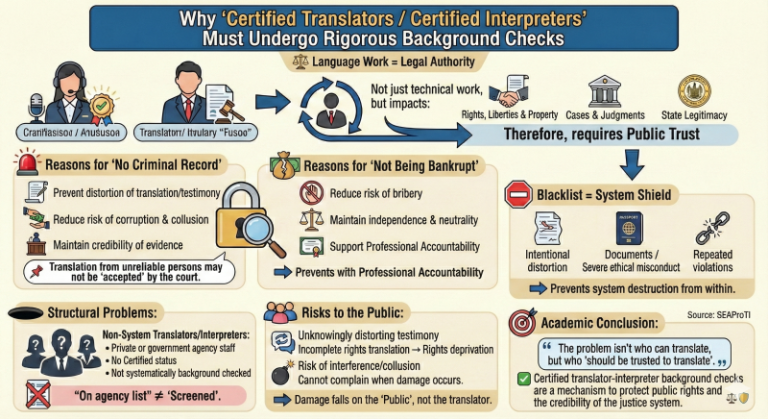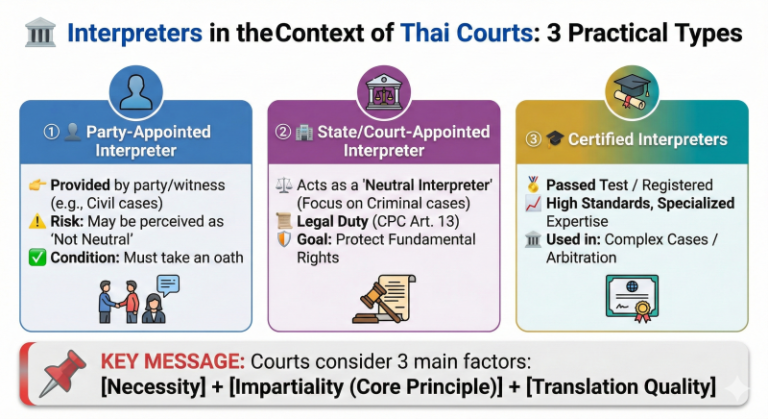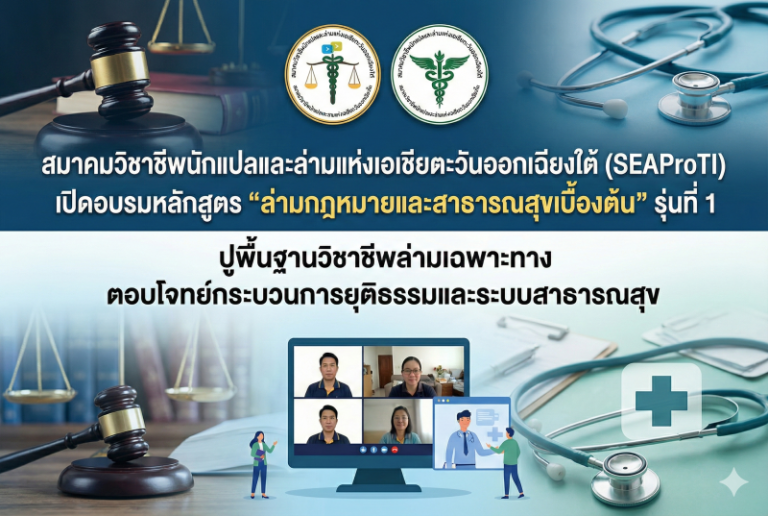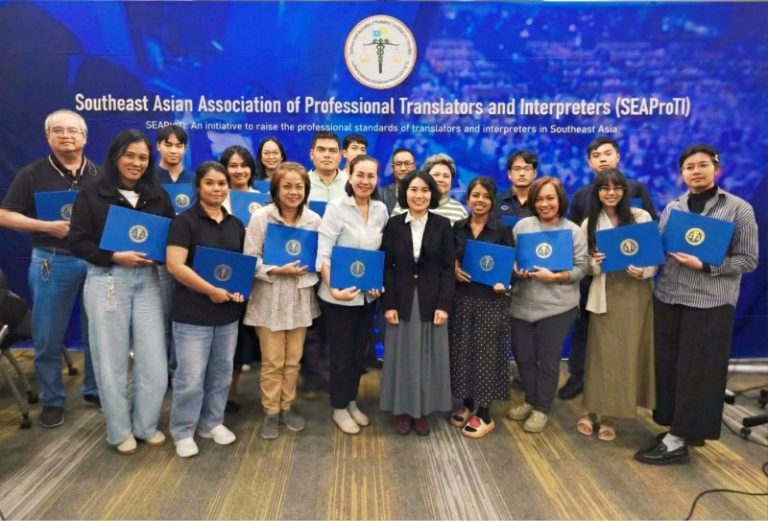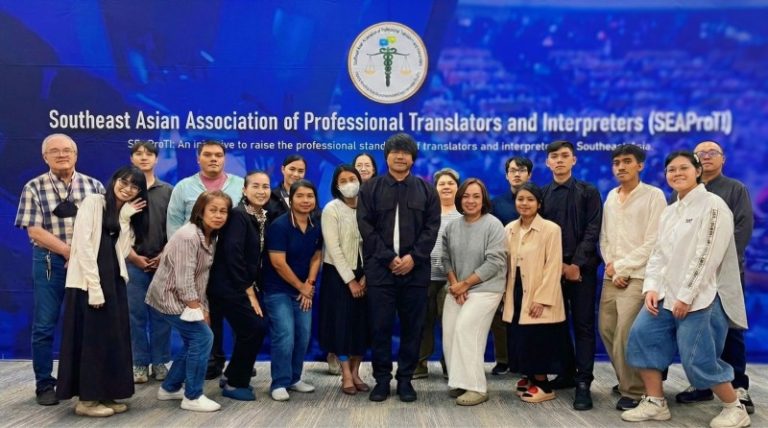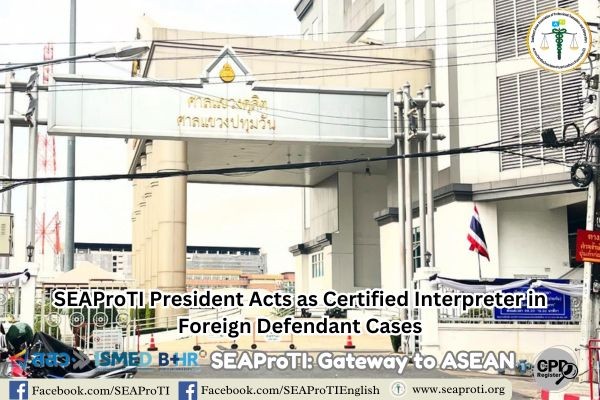Ministerial Regulation Empowers Qualified Translators, Boosting SEAProTI-Certified Professionals
10 April 2025, Bangkok – The Ministerial Regulation (B.E. 2540), issued under the Administrative Procedure Act B.E. 2539 (1996), establishes clear criteria for individuals and entities authorized to certify the accuracy of translations into Thai. According to the regulation, certifications must be provided by either a Thai national holding at least a bachelor’s degree from an institution where the document’s original language was the language of instruction; a lecturer at a higher education institution teaching the relevant language; embassies or foreign consulates in Thailand, provided the language is an official one of that country; or Thai embassies or consulates abroad.
The regulation explicitly excludes individuals or entities without these specified qualifications, including lawyers and freelance translators lacking the required academic or institutional affiliations. This regulation particularly benefits SEAProTI-certified translators and translation certification providers, as their professional qualifications typically align with these regulatory criteria, allowing them to provide officially recognized certifications for administrative purposes. Consequently, SEAProTI-certified professionals and agencies can leverage this regulation to enhance their market position, offering clients legally compliant translations for official use.
1. Who Can Certify Translations Under This Regulation?
According to Clause 1, certification of translations from a foreign language into Thai can only be performed by specific individuals or entities, namely:
-
(1) A Thai national holding at least a bachelor’s degree where the language used in the translated document was the medium of instruction.
-
This implies a requirement of higher education credentials, explicitly linked to proficiency gained from an academic program delivered in the foreign language concerned.
-
-
(2) A lecturer at a higher education institution in Thailand who teaches the particular foreign language that appears in the original document.
-
Here, the individual’s proficiency and authority come from their academic teaching role, thus assuring language competency.
-
-
(3) An embassy or foreign consulate located in Thailand, provided the translated document is in the official language of that country.
-
For instance, the French embassy in Thailand can certify French-language documents, as the embassy represents official state interests and language competency.
-
-
(4) A Thai embassy or consulate abroad.
-
These institutions inherently possess the authority to represent Thailand’s interests abroad, including authenticating translations relevant to diplomatic, legal, and administrative processes.
-
2. Who Cannot Certify Under This Regulation?
Individuals or entities without the explicitly mentioned qualifications cannot certify translations. Thus, notably excluded categories include:
-
Lawyers, unless they also explicitly hold a bachelor’s degree obtained from a program instructed in the foreign language concerned, or hold an academic position teaching the language.
-
Private translation providers or individual translators who do not hold recognized university qualifications or institutional teaching roles as defined by this regulation.
-
Any individuals or entities lacking direct affiliation or recognition from academic institutions or diplomatic authorities, regardless of practical proficiency or experience in translation.
3. Why SEAProTI-Certified Translators and Providers Benefit From This Notification?
While the Ministerial Regulation explicitly lists who can officially certify translations into Thai for administrative procedures, it does not exclude professional translation certifications recognized through established professional associations. Therefore, organizations like SEAProTI (Southeast Asian Association of Professional Translators and Interpreters) have strategic advantages and opportunities in this regulatory environment:
-
Quality Assurance and Credibility:
SEAProTI-certified translators typically already possess the required academic qualifications or teaching credentials as prescribed by this regulation. They are well-positioned to leverage their professional accreditation as evidence of their qualifications and credibility. -
Market Differentiation and Competitiveness:
SEAProTI-certified providers who employ qualified translators meeting the above criteria can position themselves prominently in the translation services market. They can explicitly market their services as fully compliant with the official legal requirements, thereby attracting clients who need translations for official or administrative purposes. -
Opportunities for Collaboration and Recognition:
SEAProTI may benefit through collaboration with embassies, consulates, and educational institutions to enhance the perceived reliability of their translations, creating a robust network of authoritative certification sources. -
Legal and Regulatory Clarity:
The explicit criteria outlined reduce ambiguity and enable SEAProTI to clearly align its professional standards and qualifications directly with legal compliance, thus offering greater value to clients requiring certified translations for administrative use.
4. Practical Impact and Recommendations for SEAProTI and Translators
SEAProTI-certified translators should:
-
Ensure documentation of their qualifications aligns precisely with Clause 1 (degree certificates, employment documentation, embassy recognition, etc.).
-
Market their translation and certification services referencing this Ministerial Regulation, highlighting explicit compliance.
-
Provide clear guidance to clients about the importance of official compliance to avoid issues with non-qualified translations.
Translators or providers without these formal qualifications must either acquire the necessary credentials or partner with qualified SEAProTI-certified translators to ensure their translated documents can be officially certified and legally recognized.
5. Who Is Specifically Excluded?
Under this regulation, entities and individuals specifically excluded from certifying translations are:
-
Individuals without relevant language-specific academic credentials.
-
Individual freelance translators lack explicit academic or diplomatic recognition.
-
Translation agencies without qualified personnel explicitly matching the regulation’s requirements, except those that are registered with the Department of Business Development (DBD).
-
General notaries or officials without direct language instruction or diplomatic credentials.
Conclusion:
The Ministerial Regulation (B.E. 2540) 1997 clearly defines who can officially certify translations for administrative processes in Thailand. While the regulation restricts certification rights to specific qualified persons and institutions, it also provides significant competitive and strategic advantages to associations like SEAProTI whose members typically meet these explicit qualifications.
This clarity helps raise industry standards, enhances the credibility of qualified professionals, and reduces confusion or ambiguity regarding the official acceptance of certified translations.
Remark:
* Administrative Procedure Act, B.E. 2539 (1996) – Revised in 2540(1997) (Original Copy from the Royal Gazette)
SEAProTI’s certified translators, translation certification providers, and certified interpreters:
The Southeast Asian Association of Professional Translators and Interpreters (SEAProTI) has officially announced the criteria and qualifications for individuals to register as “Certified Translators,” “Translation Certification Providers,” and “Certified Interpreters” under the association’s regulations. These guidelines are detailed in Sections 9 and 10 of the Royal Thai Government Gazette, issued by the Secretariat of the Cabinet under the Office of the Prime Minister of the Kingdom of Thailand, dated July 25, 2024, Volume 141, Part 66 Ng, Page 100.
To read the full publication, visit: the Royal Thai Government Gazette
SEAProTI ได้รับอานิสงส์จากกฎกระทรวงว่าด้วยการรับรองการแปล พ.ศ. 2540 อย่างไร
10 เมษายน 2568, กรุงเทพมหานคร – ในบริบทของประเทศไทยซึ่งการยื่นเอกสารราชการมักต้องใช้ คำแปลที่มีการรับรองอย่างเป็นทางการ กฎกระทรวง (พ.ศ. ๒๕๔๐) ที่ออกภายใต้ พ.ร.บ. วิธีปฏิบัติราชการทางปกครอง พ.ศ. ๒๕๓๙ ได้กำหนด คุณสมบัติผู้มีสิทธิเพื่อออกหนังสือรับรองการแปล ไว้อย่างชัดเจน ส่งผลโดยตรงต่อวงการแปลภาษา โดยเฉพาะกับผู้ประกอบวิชาชีพที่มีคุณวุฒิระดับสูง เช่น นักแปลและผู้ให้บริการรับรองการแปลที่ได้รับการรับรองจากสมาคมวิชาชีพนักแปลและล่ามแห่งเอเชียตะวันออกเฉียงใต้ (SEAProTI)
1. SEAProTI และคุณสมบัติที่สอดคล้องกับกฎกระทรวง
กฎกระทรวงฉบับนี้ระบุชัดว่าเฉพาะบุคคลหรือองค์กรที่มีคุณสมบัติตามข้อกำหนด 4 ประการเท่านั้น จึงจะสามารถออกใบรับรองการแปลจากภาษาต่างประเทศเป็นภาษาไทยได้ เช่น
-
ผู้มีสัญชาติไทยที่สำเร็จการศึกษาระดับปริญญาตรีขึ้นไป โดยภาษาที่ใช้ในการเรียนเป็นภาษาต่างประเทศนั้น
-
อาจารย์ในสถาบันอุดมศึกษาในประเทศไทย ที่สอนภาษานั้น
-
สถานทูตหรือสถานกงสุลต่างประเทศในไทย
-
สถานเอกอัครราชทูตหรือสถานกงสุลไทยในต่างประเทศ
นักแปลที่ผ่านการรับรองจาก SEAProTI มักมีคุณสมบัติด้านการศึกษา และประสบการณ์ตรงที่ ตรงตามเงื่อนไขที่กฎหมายกำหนด เช่น จบการศึกษาจากต่างประเทศในภาษาที่ตนแปล หรือมีบทบาทในภาควิชาการหรือความร่วมมือกับสถานเอกอัครราชทูต
2. ความได้เปรียบทางการแข่งขันของผู้ที่ได้รับการรับรองจาก SEAProTI
✅ ความน่าเชื่อถือสูง
การเป็นสมาชิกหรือได้รับการรับรองจาก SEAProTI แสดงถึงการมีมาตรฐานวิชาชีพที่ชัดเจน มีการตรวจสอบคุณวุฒิ และผ่านกระบวนการคัดเลือกที่เข้มงวด ซึ่ง เสริมสร้างความเชื่อมั่นให้กับหน่วยงานรัฐและเอกชน ที่ต้องใช้คำแปลเพื่อวัตถุประสงค์ทางราชการ
✅ ใช้ประโยชน์จากกฎหมายเพื่อการตลาด
ผู้ให้บริการที่ผ่านการรับรองจาก SEAProTI สามารถระบุในเอกสารประชาสัมพันธ์หรือเว็บไซต์ได้อย่างชัดเจนว่า
“ให้บริการแปลพร้อมรับรองที่เป็นไปตามกฎกระทรวง พ.ศ. 2540 – เอกสารสามารถใช้ยื่นหน่วยงานราชการไทยได้”
ถือเป็น จุดแข็งทางการตลาด ที่คู่แข่งทั่วไป (เช่น ฟรีแลนซ์ที่ไม่มีวุฒิที่กำหนด) ไม่สามารถอ้างอิงได้
3. โอกาสทางวิชาชีพและความร่วมมือระดับนานาชาติ
กฎกระทรวงเปิดทางให้ SEAProTI สามารถร่วมมือกับ:
-
สถานทูต/สถานกงสุล เพื่อให้เกิดมาตรฐานการรับรองร่วม
-
สถาบันการศึกษา เพื่อจัดอบรมหรือผลิตนักแปลที่มีคุณสมบัติตรงตามกฎกระทรวง
-
หน่วยงานราชการ เช่น สำนักทะเบียน บริการออกหนังสือรับรอง/คำสั่งราชการ เพื่อพัฒนาระบบรับรองร่วมกับรัฐ
ซึ่งจะเสริมบทบาทของ SEAProTI ให้กลายเป็น “ตัวกลางมาตรฐาน” ด้านการแปลในภูมิภาค
4. แนวทางแนะนำสำหรับนักแปลที่ได้รับการรับรองจาก SEAProTI
-
เก็บรวบรวมหลักฐานคุณสมบัติอย่างครบถ้วน เช่น ใบปริญญาบัตร หลักฐานการทำงานในสถาบันอุดมศึกษา หรือหนังสือรับรองจากสถานทูต
-
ระบุความสามารถในการรับรองตามกฎหมายบนใบเสนอราคา/ตราประทับ
-
แนะนำลูกค้าให้ตระหนักถึงการใช้บริการผู้มีสิทธิตามกฎกระทรวง เพื่อหลีกเลี่ยงปัญหาที่อาจเกิดขึ้นจากคำแปลที่ไม่ได้รับการรับรองอย่างถูกต้องตามกฎหมาย
5. ผู้ที่ “ไม่สามารถ” รับรองการแปลตามกฎกระทรวงนี้
-
บุคคลใดที่ไม่มีวุฒิด้านภาษาเฉพาะ
-
นักแปลฟรีแลนซ์ที่ไม่มีคุณวุฒิจากสถาบันที่ใช้ภาษาต่างประเทศในการสอน
-
บริษัทแปลที่ไม่มีบุคลากรตรงตามเกณฑ์ (ยกเว้น บริษัทแปลหรือร้านแปลที่จดทะเบียนถูกต้องตามกฎหมายกับกรมพัฒนาธุรกิจการค้า กระทรวงพาณิชย์ ซึ่งได้อำนาจในการแปลจากตรงนั้น)
-
ผู้ทำหน้าที่รับรองทั่วไป เช่น Notary Public ที่ไม่มีบทบาทด้านภาษาโดยตรง
สรุป
กฎกระทรวงว่าด้วยการรับรองการแปล พ.ศ. 2540 นี้ แม้จะกำหนดข้อจำกัดในการรับรองการแปล แต่ในอีกด้านหนึ่งกลับเป็น โอกาสเชิงกลยุทธ์ ของสมาคมวิชาชีพอย่าง SEAProTI ซึ่งสามารถวางตำแหน่งเป็นผู้นำด้านมาตรฐานการแปลสำหรับเอกสารราชการในประเทศไทย นักแปลและผู้ให้บริการที่ได้รับการรับรองจาก SEAProTI ควรใช้ประโยชน์จากข้อกฎหมายนี้เพื่อส่งเสริมความน่าเชื่อถือ เพิ่มโอกาสทางวิชาชีพ และพัฒนาบริการอย่างยั่งยืนในระยะยาว
หมายเหตุ:
* กฎกระทรวง (พ.ศ. ๒๕๔๐) ออกตามความในพระราชบัญญัติวิธีปฏิบัติราชการทางปกครอง พ.ศ. ๒๕๓๙
เกี่ยวกับนักแปลรับรอง ผู้รับรองการแปล และล่ามรับรองของสมาคมวิชาชีพนักแปลและล่ามแห่งเอเชียตะวันออกเฉียงใต้
สมาคมวิชาชีพนักแปลและล่ามแห่งเอเชียตะวันออกเฉียงใต้ (SEAProTI) ได้ประกาศหลักเกณฑ์และคุณสมบัติผู้ที่ขึ้นทะเบียนเป็น “นักแปลรับรอง (Certified Translators) และผู้รับรองการแปล (Translation Certification Providers) และล่ามรับรอง (Certified Interpreters)” ของสมาคม หมวดที่ 9 และหมวดที่ 10 ในราชกิจจานุเบกษา ของสำนักเลขาธิการคณะรัฐมนตรี ในสำนักนายกรัฐมนตรี แห่งราชอาณาจักรไทย ลงวันที่ 25 ก.ค. 2567 เล่มที่ 141 ตอนที่ 66 ง หน้า 100 อ่านฉบับเต็มได้ที่: นักแปลรับรอง ผู้รับรองการแปล และล่ามรับรอง


